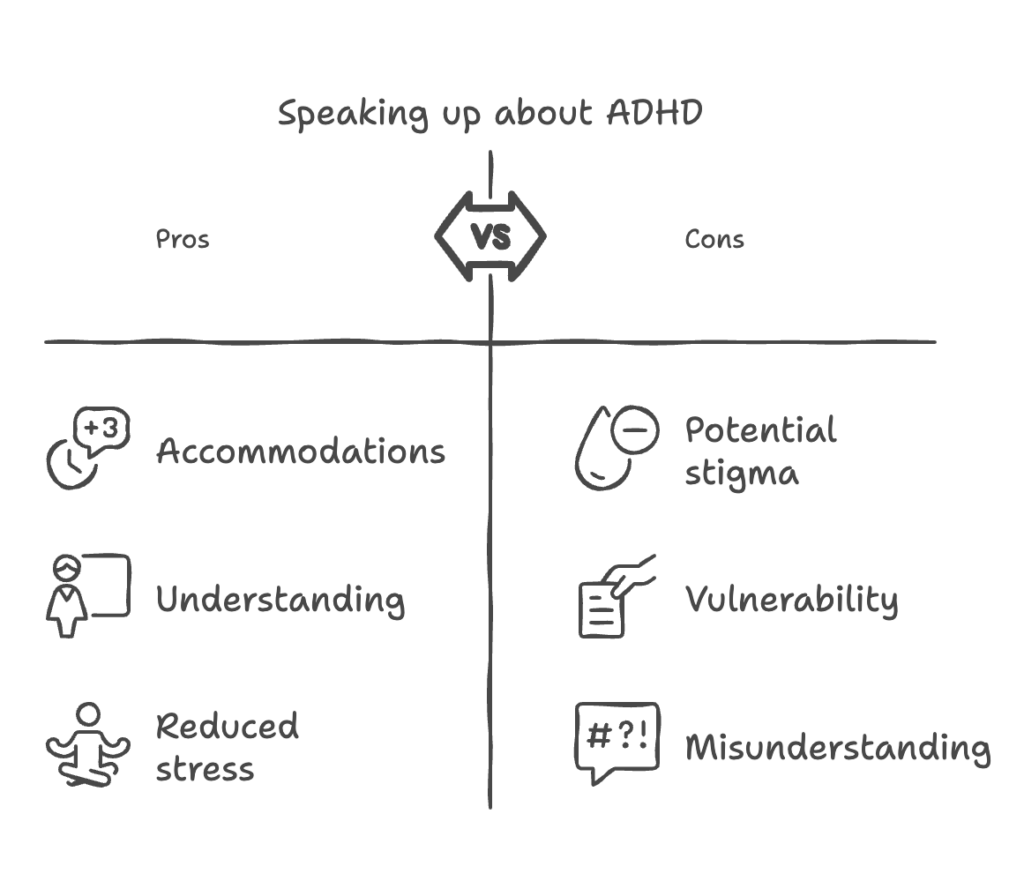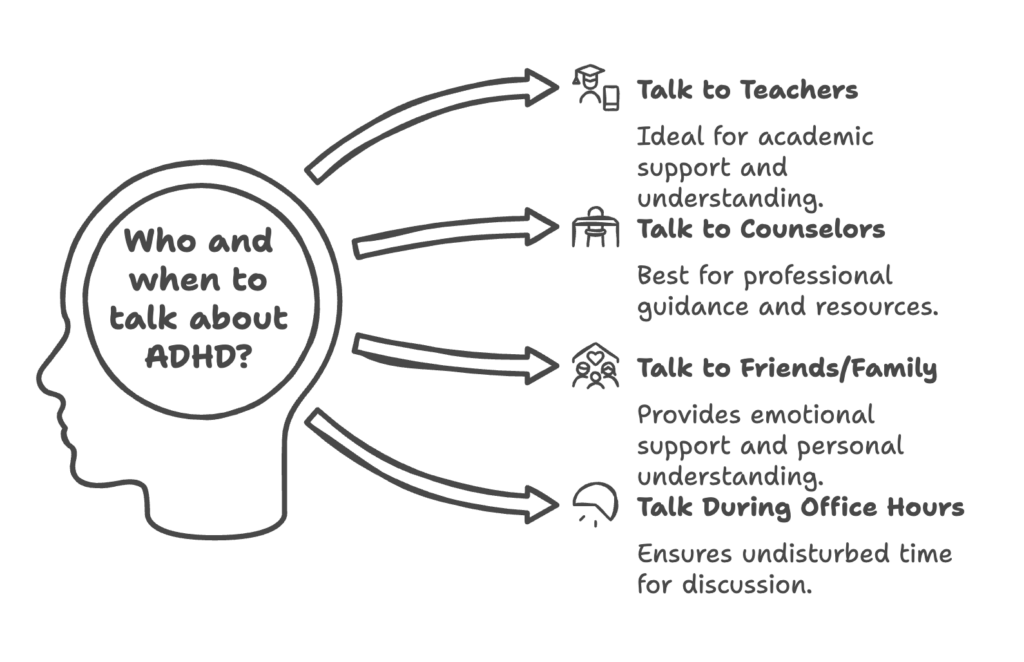Start by Owning Your ADHD Story
Before you can talk to others about how ADHD affects your academics, it’s important to understand your own experience. Everyone’s ADHD is different, so think about how it shows up for you.
Ask Yourself:
- What are the biggest challenges ADHD creates in school?
- How does it affect your study habits, test-taking, or ability to complete assignments?
- What strategies have helped you in the past (or what hasn’t worked)?
Know Why It’s Important to Speak Up
Talking about ADHD isn’t just about airing your frustrations—it’s about getting the support you need to succeed. Teachers and professors can’t read your mind, and friends may not fully understand what you’re dealing with unless you tell them.
Key Benefits of Speaking Up:
- Accommodations: Extended test times, note-takers, or quiet spaces can level the playing field.
- Understanding: Teachers can adjust their expectations or teaching style to better support you.
- Reduced Stress: You’ll feel less alone when people know what you’re navigating.

Step 1: Choose the Right Person and Time
Talking about ADHD requires a little strategy. Decide who you want to speak with and when to approach them.
Who to Talk To:
- Teachers or professors you feel comfortable with.
- School counselors or academic advisors.
- Friends or family members for emotional support.
When to Talk:
- During office hours or a quiet moment after class.
- In a one-on-one meeting where you won’t feel rushed or interrupted.
- As soon as challenges arise, so you don’t fall too far behind.

Step 2: Be Honest, But Keep It Solution-Oriented
When you’re ready to talk, explain how ADHD affects your academics in a clear and relatable way. Avoid focusing solely on the negatives—pair your struggles with ideas for solutions.
What to Say:
- Start with your experience: “I have ADHD, and I’ve noticed it makes it hard for me to [stay organized, focus in class, meet deadlines, etc.].”
- Explain the impact: “This has been affecting my grades because [specific example].”
- Suggest solutions: “I think [accommodation or strategy] could really help me succeed.”
Step 3: Use Simple, Relatable Analogies
If you’re explaining ADHD to someone unfamiliar with it, analogies can make things clearer.
Examples:
- “It’s like having 50 browser tabs open in my brain at once.”
- “Imagine trying to watch a movie while a marching band plays behind you—that’s how lectures feel sometimes.”
- “ADHD isn’t about being lazy; it’s like my brain’s engine is always running, but sometimes it skips gears.”
These analogies can help others empathize with what you’re experiencing.
Step 4: Advocate for Specific Accommodations
If you’re seeking accommodations, be prepared to explain what would help. Here are some common supports for students with ADHD:
- Extended Time: On tests, quizzes, or assignments.
- Priority Seating: Sitting at the front to minimize distractions.
- Quiet Spaces: For exams or study sessions.
- Technology Tools: Access to recording devices, apps, or note-taking software.
Pro Tip: Check if your school has a disability resource center or special education office. They can provide formal documentation and help you secure accommodations.
Step 5: Address Misconceptions
Not everyone understands ADHD, and that’s okay—it’s your chance to educate them!
What to Emphasize:
- ADHD isn’t about intelligence; it’s about how your brain processes information.
- You’re not “making excuses”—you’re asking for tools to succeed.
- With the right support, you can thrive just like anyone else.
Step 6: Follow Up and Show Progress
After the conversation, follow through on any agreements or accommodations. This shows that you’re serious about improving and helps build trust with your teachers or professors.
How to Follow Up:
- Send a quick email thanking them for their support and summarizing what you discussed.
- Share updates on how the accommodations or strategies are working.
- If something isn’t helping, don’t be afraid to ask for adjustments.
Example:
“Thank you for allowing me extra time on the last exam—it really helped me focus and complete the questions. I think this will make a big difference going forward.”
For the Journey
Talking about ADHD and its impact on your academics isn’t always easy, but it’s worth it. By opening up, you’re advocating for yourself and showing the world how capable you are.
Remember, ADHD doesn’t define you—it’s just one piece of your story. With the right strategies and support, you can turn those academic challenges into opportunities to shine.









